 |
|
|
Hannah's Visit
Click the photo to see more about our visitor from the UK. |
|
 |
|
|
Esala Perahera 2017
Click the photo for more about this festival. |
|
The World is Upside-down, October 13, 2017
| Bhikkhus, there are these two kinds of illness. Which two? Bodily illness and mental illness. People are found who can claim to enjoy bodily health for one, two, three, four, and five years; for ten, twenty, thirty, forty, and fifty years; and even for a hundred years and more. But apart from those whose taints have been destroyed, it is hard to find people in the world who can claim to enjoy mental health even for a moment.
--Anguttara Nikaya 4, 157 |
|||
|
Verses from The Dhammapada 129. All tremble at violence; all fear death. Putting oneself in the place of another, one should not kill nor cause another to kill. 130. All tremble at violence; life is dear to all. Putting oneself in the place of another, one should not kill nor cause another to kill. 131. One who, while himself seeking happiness, oppresses with violence other beings who also desire happiness, will not attain happiness hereafter. 132. One who, while himself seeking happiness, does not oppress with violence other beings who also desire happiness, will find happiness hereafter. 136. When the fool commits evil deeds, he does not realize their evil nature. The witless man is tormented by his own deeds, like one burnt by fire. 137-140. He who inflicts violence on those who are unarmed, and offends those who are inoffensive, will soon come upon one of these ten states: sharp pain, or disaster, bodily injury, serious illness, or derangement of mind, trouble from the government, or grave charges, loss of relatives, or loss of wealth, or houses destroyed by ravaging fire; upon dissolution of the body that ignorant man is born in hell. |
|||
| Having compared oneself with others, one should practice loving-kindness towards all beings by realizing that everyone desires happiness.
--Meditation on Loving-kindness |
|||
|
|||||||
|
|||||||
Loving-kindness is to be radiated universally, to all beings, without discrimination, with the recognition that we are all the same.
In sharp contrast to this, the mentally unhealthy person tends to focus on differences, perhaps to the point of obsession, in a process which can be called "othering."
This has been aptly described by Yiannis Gabriel.:
|
Othering is the process of casting a group, an individual or an object into the role of the "other" and establishing one's own identity through opposition to and, frequently, vilification of this Other. . . . Othering is a process that goes beyond "mere" scapegoating and denigration--it denies the Other those defining characteristics of the "Same," reason, dignity, love, pride, heroism, nobility, and ultimately any entitlement to human rights. Whether the Other is a racial or a religious group, a gender group, a sexual minority or a nation, it is made rife for exploitation, oppression and indeed genocide by denying its essential humanity, because, as the philosopher Richard Rorty put it, "everything turns on who counts as a fellow human being, as a rational agent in the only relevant sense--the sense in which rational agency is synonymous with membership of our moral community." (Rorty, R. 1993. "Human rights, rationality and sentimentality," In S. Shute, & S. Hurley (Eds.), On human tights: 112-134. New York: Basic Books, p. 124)." |
|||
Othering is the root cause of genocide--Rwanda, Bosnia, Cambodia, the Armenians, Tasmanians, Native Americans, and, now, the Rohingyas, Puerto Ricans, blacks, and the poor (thanks to Corporate/Government policies)
According to Buddhism, we have all been wandering on the wheel of life and death, reborn according to kamma, for eons and eons, in a beginningless cycle called Samsara. During that meandering, we have all been related again and again. There is no being who was not, at some time, my mother, and no being whom I have not, at another time, mothered. In this cycle, there is no legitimate place for patriotism, nationalism, or ethnic chauvinism
We have no permanent, reliable, or unchanging soul or self, but this lack causes suffering. Thus, the mind spends much of its time trying to reify itself into something stable, trustworthy, and, of course, better than anybody else's. This is the basis of mental illness.
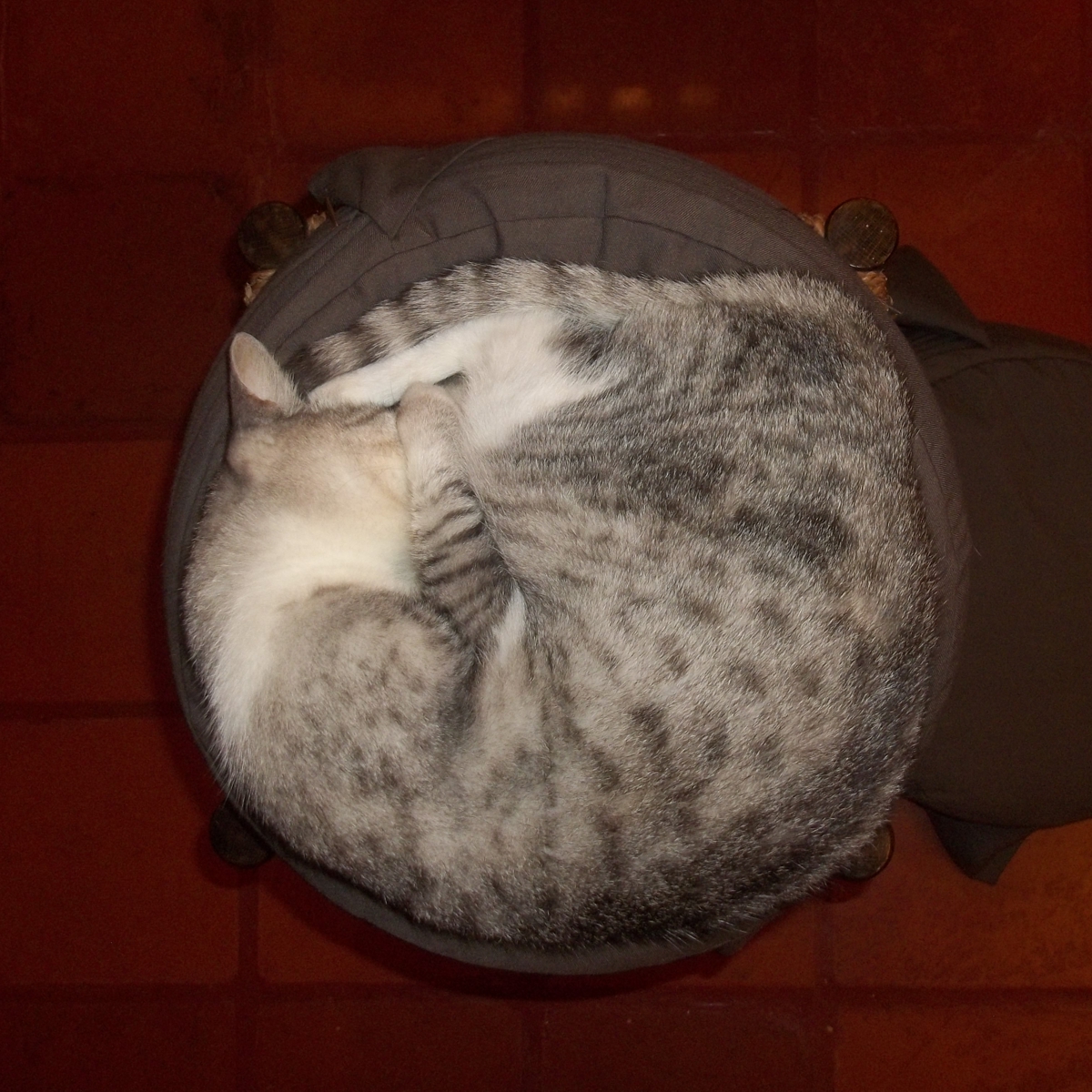 |
|
|
Nezumi
Click the photo to view Nezumi's page. |
|
Let's look for a moment at just the United States. American health professionals tell us that Trump is making us sicker. A recent study in the New England Journal of Medicine provides evidence that suggests that the campaign and the subsequent election of Donald Trump has had a negative effect on the mental well-being of Americans, especially those in marginalized groups who are vulnerable to discrimination.
In a recent survey study with a massive sample size of 2000 elementary and high school teachers, over half of respondents reported that since the 2016 presidential campaign began, they have observed an increase in racial and ethnic slurs and general hostility among students. 67% of these teachers said that students who were immigrants, children of immigrants, or Muslims, felt fear and worry over how they or their family might be treated after the election. Furthermore, a separate study by the Southern Poverty Law Center has reported a growing number of incidents of harassment and intimidation since Trump's election, with most of these occurring in public schools.
In a recent interview with Rachel Maddow, Former Secretary of State Hilary Clinton expressed the view that President Trump's open bigotry has given many Americans the "right" to express their own prejudices and animosities. Previously, this othering was, to some extent, kept in check. Now it seems that any insult, any obscenity is allowed. We seem to have lost the capacity to be shocked or outraged.
One issue that has occupied a lot of our time recently, particularly on Facebook, is Burma, or, as some call it, Myanmar. Fundamentally, the problem there is the same as in the United States and elsewhere: racism, prejudice, chauvinism, and a brutal fascist state.
|
The Myanmar state has historically adopted strategies of "othering" the Rohingya, dehumanising them as "illegal Bengalis". The Rohingya have been isolated from society, forced into squalid open-air prisons, confined to villages, and denied livelihood opportunities. They have been harassed though disenfranchisement and violent intimidation. They suffer from destitution, malnutrition, starvation, and severe physical and mental illness as a result of restrictions on movement, education, marriage, childbirth, and the ever-present threat of violence and extortion. .... As well as making it easier for neighbours, business partners and even friends to kill one another, labelling the target group an "enemy of the state" also reinforces popular support for the military and a nationalistic agenda. On September 1, Myanmar's defence commander-in-chief, Min Aung Hlaing, declared that "entire government institutions and people must defend the country with strong patriotism", going on to describe the "Bengali problem" as a longstanding "unfinished job, despite the efforts of the previous governments to solve it". "We openly declare that absolutely, our country has no Rohingya race," he said Juan Cole, "Rohingya crisis: this is what genocide looks like" |
|||
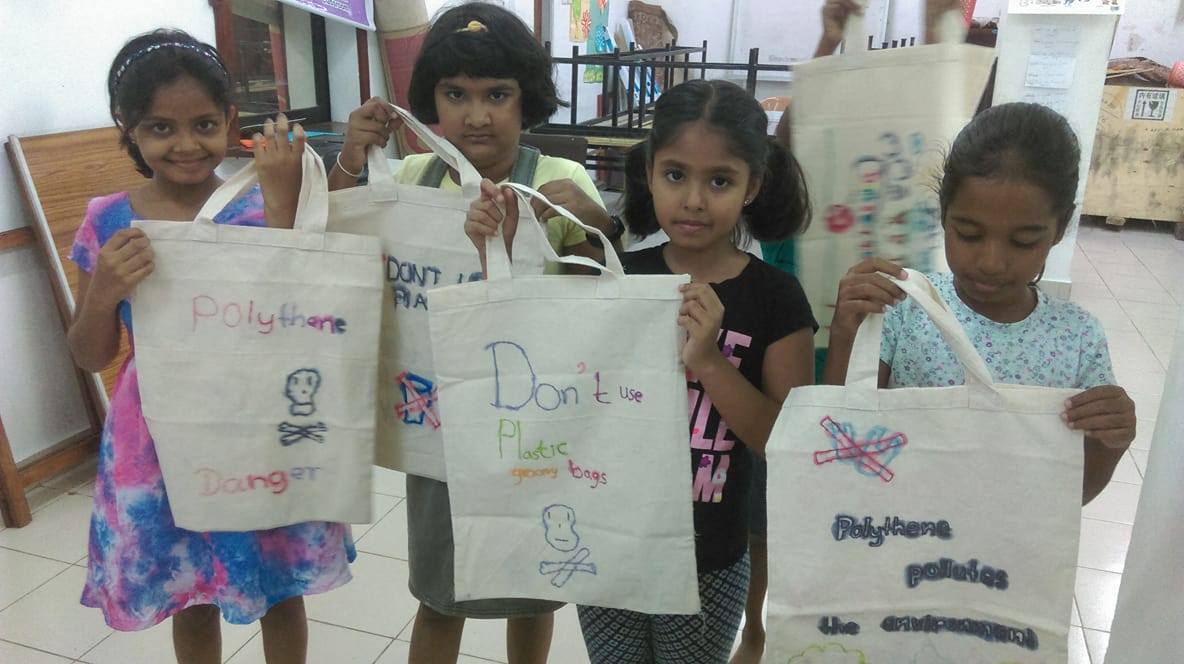 |
|
|
Plastic News Reused!
Julia used our lesson plan at School of English, Kandy, with great success. Click the photo to see some of the bags the students created. |
|
Notably, last month, The Permanent Peoples' Tribunal (PPT), initially established by Lord Bertrand Russell and Jean-Paul Sartre to consider the Vietnam War, after an extensive investigation and many hearings, announced: "The State of Myanmar is fully responsible for genocide against the Rohingya people." The Argentinian jurist, Daniel Feierstein, further stated, "Moreover, that genocide against the Rohingya is now taking place with ongoing acts of genocide, and the possibility the casualties of that genocide could be even higher in the future if nothing is done to stop it,"
The oppression of the Rohingya has been going on for many years. We have written about it in previous reports and included numerous articles. We will not rehash the history here. Our friend, Chris Lewa, has been documenting the violence and discrimination since 1999 for the Arakan Project. This is an excellent source for the background and history.
Another friend whom we met twenty years ago is Dr. Maung Zarni, Non-Resident Fellow at The Sleuk Rith Institute, Cambodia's Permanent Documentation Centre. He has been campaigning for human rights for three decades, most particularly against the growing state-sponsored racism against religious and ethnic minorities in what he calls "the Buddhist Triangle" (Burma, Sri Lanka and Thailand). For that work he was honored with "The Cultivation of Harmony" award by the Parliament of the World's Religions, the world's oldest interfaith organization. In 2013, he sounded a warning for journalists about the dangers of accurate reporting about Burma:
|
...there is absolutely nothing sectarian or communal about the violence that has been unleashed in waves and phases by the organized Buddhist mobs and executed with "brutal efficiency," as the UN special envoy for Burma, Vijay Nambiar, put it. The violence against the now terrorized and permanently displaced populations of Rohingyas and other Muslims in 15 towns across the country is one-way, organized, and state-backed. Overwhelmingly, it has been one single community that has borne the death and devastation wrought by all this violence: the Muslims, including the Rohingyas and Muslims who are ethnically Burmese. ...international journalists go with their own pet narratives and paradigms. Consequently, they get their Burma stories horribly wrong, identifying trees but unable to see the forest that the trees make up. Thus the state-orchestrated anti-Muslim terror campaign degenerates into "communal violence," and the man with no integrity becomes "a pursuer of peace" and a sincere reformer. . . . "When reporting about Burma, it helps to be able to see the world through the eyes of sociopaths and psychopaths. From the ruling generals to certain elements of Burmese society, Burma has both in abundance. Without taking their mindset into account, one is bound to end up with half-baked analyses that don't do justice to our attempts to understand the twisted world of Burmese politics. |
|||
The oppression of the Rohingya is actually an extension of the oppression of the Karen, the Kachin, the Shan, the Mon, and other ethnic groups in Burma. What is different is that, because the Rohingya are Muslim, the Buddhist Bamar, including Aung San Suu Kyi, accept and whitewash the state-backed oppression. It is disappointing to see so many of those we supported and stood with from the '88 generation now denying the Rohingya, blaming them for the violence, and supporting the same government that they themselves, not so long ago, so ardently opposed.
As it was then, it still should be a question of human rights, human rights for all. Instead, however, many of our former friends and students are asking us to share their prejudices and to hate those they hate. To them and to those who find support and validation in Trump's racism and Islamophobia, we must reply, "No, thank you!" To those who advocate violence to protect Buddhism, we reply, "You're mad."
The anti-Rohingya campaign on Facebook has been waged with great fervor, not only by Burmese, but also by a number of Bangladeshis, Chakmas, and Baruas, who seem to feel they have something to gain in the matter or just want to vent their Islamophobic spleens. To counter this vicious attack on the Rohingyas, we have consistently posted articles from reputable and indisputable sources.
Some of the "correspondence," if that is what you call postings and messages on Facebook, have been vitriolic. To a clear-thinking person, they should be embarrassing. We won't identify anyone, but the list includes monks and students, both former and current. This is just a sample (unedited) of the hundreds received:
|
KVK, we know u r too paid for the cause of illegal Bangladeshi immigrants, and propagating with all sort of links and replying with ready made comments and wasting ur valuable days . So I don't give any shit on ur comment! |
We know our country best!
|
|
| KVK, let me give u a free advice, Ur days r numbered, u r old enough, so why don't u spend ur times by meditation n practicing Dhamma and the like? Instead, u r wasting ur last valuable days in doing all these brainwashing and disturbing things! Pity on You! |
We don't care any News paper and anyone. if you have a compassion and loving-kindness, you should bring Musalim with you in your house. ha..ha...haaa" | |
| You are embarrassing yourself and your teachers. Please stop showing off your ignorance, your inadequate knowledge, and your lack of empathy. You should be ashamed of this ignorant, condescending, unfeeling letter and now all Buddhist monks are knowing you are very dangerious for Buddhist community. You are not Upasaka. You should go and attend to Mosque !You should remove the word "visakha" from your name. You are not worthy of the Word "Visakha" because real Visakha was devoted to Buddhism and supported to Buddhism only, then they did not belived in other religion. They belived in only Buddhism, Bhikkhusamgha and supported Buddhism and Bhikkhusamgha but now you are doing and supporting to destroy Buddhism, Bhikkhusamgha and Buddha's sasana. | ||
Another monk wrote that metta, loving-kindness, could only be practiced universally by Arahats!
In reaction to the repeated postings by one monk, a former student, alleging that the atrocities were really being carried out by the Rohingyas against the Buddhist Rakhines, we sent the link to "The Eight Stages of Genocide." His response was:
| I rather do my homework first. There is no denial that there is a conflict going in Arakan. But many stupid biased medias spreading propaganda as a religious conflict. I don't wanna talk anymore about this cause it won't bring any solution. And I will be thankful if you can avoid sending me any msgs about Myanmar, CHT, Arab, Trump or whatsoever. Because I don't have any authorities to stop whatever is happening around the world. I do have authorities only what can I change my Karma and my mind. An empty cup cannot fill another empty cup. | |||
This is enough to make one almost despair of teaching logic and critical thinking.
Dr. Zarni has been called a traitor. Lots of other Western friends of Burmese democracy have been abused and belittled by friends, students, and strangers. Some women activists have received obscenities and death threats. In a tweet, which was later posted on Facebook, Nobel Peace Prize Laureate, Malala Yousafzaiin, urged Aung San Suu Kyi to condemn the shameful violence against the Rohingyas. Several smarmy Burmese and Bangladeshi "patriots" saw fit to mansplain the Rohingya situation to her. Here are both her plea and one response:
Every time I see the news, my heart breaks at the suffering of the Rohingya Muslims in Myanmnar. I call for the following:
Over the last several years, I have repeatedly condemned this tragic and shameful treatment. I am still waiting for my fellow Nobel Larueate Aung San Suu Kyi to do the same. The world is waiting and the Rohingya Muslims are waiting. |
Dear Malala, |
On the other hand, there have been a few voices of reason and sanity among the Burmese.
It took great courage for the former ABSDF chairman, Naing Aung, to write this:
|
They are illegal migrants...so what...we, the Burmese people have been migrating to neighbouring (countries) for last 30 years and the people in the world have been migrating for centuries. What we are talking about here is humanity concern... They are not citizens.....so what...do you mean that they don't have to live... They want to be called as Rohingya and they are asking for the state....so what.....they could be called as they want like our names....we are calling them Kalar and obviously they don't want to be called like that..so let them have what they want to be called but say that they cannot have autonomous state as like other ethnic nationalities or race (but remember that in international political terms, they will be called as ethnics like Chinese ethnic, Indian ethnics etc,) Don't push them into ISIS trap and don't agitate the bees from beehives. You can hate me for saying this but we have to fight religious extremism with tolerance and loving kindness." |
|||
And later:
|
I feel bad and painful to see that most of Burmese people and activists are fighting with international media and longtime international supporters of Burmese democracy movement who have been helping our democratic cause. sometimes I am wondering how they view their support at this point. However China has never changed its position as it always support and stand with Burmese government whether it is military or pro-democracy. |
|||
 The earlier mention of our teacher was particularly amusing. We marvel that we so fortunate to have the very best and most compassionate of Burmese teachers. Among the hundreds of monks we have met, studied with, and taught English to, there has been no one to compare with Ven. U Khe Min Da Sayadaw. Born in Toungoo, he went to Japan with Mahasi Sayadaw in 1956 and spent the rest of his life at the World Peace Pagoda in Moji. Well-educated, multi-lingual, sensible, and compassionate, he had not a shred of chauvinism, male or otherwise. Scrupulous in his practice, he had a prodigious memory and the ability to relate everything to the Dhamma.
The earlier mention of our teacher was particularly amusing. We marvel that we so fortunate to have the very best and most compassionate of Burmese teachers. Among the hundreds of monks we have met, studied with, and taught English to, there has been no one to compare with Ven. U Khe Min Da Sayadaw. Born in Toungoo, he went to Japan with Mahasi Sayadaw in 1956 and spent the rest of his life at the World Peace Pagoda in Moji. Well-educated, multi-lingual, sensible, and compassionate, he had not a shred of chauvinism, male or otherwise. Scrupulous in his practice, he had a prodigious memory and the ability to relate everything to the Dhamma.
We met him frequently and studied under him for almost twenty years, but we cannot recall a single instance of him ever getting upset or disparaging anyone. He was able to accommodate himself to any group and to make anyone feel comfortable in his presence. Once, he told us about his childhood with Muslim and Hindu friends: "We always celebrated each other's holidays--the Eid feasts and the pujas at the temple. All of them were grand and to be shared! I used to tease my Hindu friends, though, that Ganesh was really a missed opportunity. It would have been better if Shiva had put his son's head on an elephant's body. That would have been irresistible--clever and strong!"
 |
|
|
Visakha's Birthday Party
Click the photo for photos and to read about the party. |
|
We heard, through the grapevine, that the Burmese Embassy in Japan, knowing that we supported the students and refugees on the Thai-Burma border and that we frequented the pagoda, had asked both the abbot, Ven. U Wepulla, and Ven. U Khe Min Da to forbid us to meditate there. Both monks continued to welcome us, and neither ever mentioned it to us.
Ven. U Khe Min Da never asked us about our support of the students and refugees, but he frequently gave us extra robes for the monks of ABYMU staying in the liberated areas along the Thai/Burma border. He knew that we were very close to ABSDF, which sometimes called itself a student army. His adherence to vinaya was impeccable. He declared that it was the vinaya that had enabled the Sangha to last for so long. Several times, he pointed out to us that, should a monk be involved in a demonstration or protest which resulted in violence, that monk could be held responsible, according to vinaya, for any death that occurred, and, thus, he would be subject to parajika or defeat.
There are a couple of wonderful fallacies being used often when talking about the Rohingya genocide. First, there is the fallacy of false equivalence, where a Burmese complains:
|
I have never seen your posts on Facebook that mention about terrorist attack to Hindu people in Burma. That is unfair. Do you know how many Rakhine and Hindu people were killed in Rakhine state by terrorists? Is it Human Right? Every Rohingya should have the right to kill anyone by any mean? "I don't support any violence in my country but appreciate peace, harmony and prosperity. I have some Muslim friends who stand with our government's position. Media news should be based on principles of justice. Ridiculously , the terrorists's attack is little mentioned in the medias of West and Middle East, including in your Facebook page. |
|||
Obviously the magnitude of state violence against a hapless population is massively greater than any (unverifiable) terrorist attacks. Compare that to this:
"The Deepwater Horizon oil spill is no different from your neighbor dripping some oil on the ground when changing oil in his car." Which is patently absurd, since Deepwater Horizon spilled 210 million US gal of oil, while your neighbor would only be spilling about a pint!
Another extremely popular bogus argument can be called Whataboutism, or, as the British say, "Whataboutery." It's a variant of the tu quoque logical fallacy whereby one attempts to discredit an opponent's position by accusing him of hypocrisy while ignoring his argument. One may claim that people from other countries have no right to criticize Burma because their own governments are also committing human rights violations, but that in no way lessens the severity of crimes being committed by the Burmese state and army against the Rohingyas. It's only an attempt to divert attention.
 |
|
|
From Our Garden
Click the photo to see more photos. |
|
We are painfully aware, more so every day, that the United States is besotted with racism, founded on genocide, and built by slaves. That the country had two terms with a black president seems to have resulted, tragically, in the election of the first "white" president, elected for his white supremacy by racists and fascists. There is no argument that much of the United States is, indeed, racist. There is an alarmingly strong element of white supremacy in our society. For many Americans, it is very easy, perhaps even natural, to become a racist, to absorb racism by osmosis, so to speak. A propos to this, a professor has recently written a memoir, The Making of a Racist: A Southerner Reflects on Family, History, and the Slave Trade. We have not read the book, but the review is extremely interesting and thought-provoking.
We have relatives who are bigots. We're learning that some of our friends are also racists and nationalists. We were fortunate, however, even though we grew up in "white Protestant" communities (Ken's father was Japanese, but Ken never personally experienced any discrimination.), to have had parents who were tolerant and abhorred prejudice. Visakha's father's close friend was black; the two of them had ridden the rails together during the Depression, and Visakha thinks of them when she hears Tom Paxton's "Rambling Boy." Her father told stories about the horrors of KKK rallies in Michigan and the injustice of sunset laws ("N*****, don't let the sun set you in Owosso!") Rev. Taylor, the minister of the church in which Visakha was raised, spoke disapprovingly of that selfish Christianity which he described as "Bless us four and no more!" That's the one sermon she clearly remembers. Ken's father was a chef in a hotel in a nearby city, and, as a boy, Ken sometimes visited the homes of several of the black kitchen workers. That seemed normal to him.
Then came the sixties. civil rights became the dominant issue. By this time, Visakha had finished high school and was attending classes with black students in college. With her first pay check as a tutor, she joined the NAACP. For Ken, 1963 was pivotal. Here is his story.
|
Early in that year, the minister of our small church, Brownhelm United Church of Christ, invited members of the youth group to spend a weekend in Cleveland with a black families. (Brownhelm was a village with a population of only 700.) I was the only volunteer. It was a wonderful experience. It was the first time I had spent any extended time with blacks. We attended a performance of Leonard Bernstein's "Candide," at Karamu, the famous inter-racial theater in Cleveland. That weekend shone a personal spotlight on the news of sit-ins and protests taking place that year all around the country. A few weeks later, the Ohio Conference of the United Church of Christ announced that a youth delegation would be visiting Atlanta for two weeks and staying with black families. Again, I was the only one in my church to volunteer. During those two weeks, we got to know our black counterparts very well. We played and worked together, but we also attended serious meetings in which we discussed civil rights, segregation, and prejudice. I had never personally confronted these issues, but integration seemed so right and natural that it was impossible not to want to get involved.
Here are links to 2 videos. 1, from the National Archives, is very informative about the organization of the march, but the audio of Martin Luther King's speech has been redacted. 2 is video, with audio of the "I Have a Dream" speech. |
|||
Both Ken and Visakha ceased being Christian in their youth; remaining agnostics until they became Buddhists in 1979. Visakha joined the Peace Corps right after graduating from Oakland University. This is her story:
|
||||||||||||||||||
Sadly, racism and ignorant Islamophobia are as American as apple pie. In reality, nationalism is nothing more than pride in things you had nothing to do with, and emotional justification for hating people you don't know.
Let us pay tribute to those who have been caring for elderly parents. One dear friend tried valiantly to follow his late father's intentions and to protect his mother, who was suffering from Alzheimers, from a step-sister who conned their mother into signing away power of attorney, claimed all the property, and abused herr. Although he tried all legal channels, he failed to regain custody and suffered as he watched his mother belittled and mistreated. We must trust that kamma will repay his selfish stepsister. Another friend had to return to the US when his aged mother fell and could no longer stay in her home. In a short time he had to find her a good assisted-living facility, to clear out 80 years of accumulated furniture and stuff, and to arrange for the sale of the condo she'd lived in for much of her life. He managed everything with mindfulness and great care for his mother, whom he works hard to support. A third friend returned to Canada to find that her mother's health had deteriorated, that she wasn't eating well, and that housekeeping had gone from bad to worse, especially with so many indoor cats shedding all over! At first, her mother resisted any change, making herself and her family upset, but our friend discovered that her mother really enjoyed wordsearch puzzles. These puzzles not only challenged and amused her, but took her mind off the problems, and made the situation much more comfortable for everyone. Healthcare and nurses' visits have been arranged, our friend is returning to Asia, and her mother is much happier. One more friend went back to the States several months ago to take care of his dad, who had been diagnosed with inoperable cancer. He served as the chief caregiver during the chemotherapy and radiation treatments. He also worked hard to rationalize the house. When his father was stabilized and further treatment ruled out, our friend organized a network of friends, neighbors, home nurses, and physical therapists to look after his father so that he could return to Asia until his father needed 24-hour care. He has returned to the States. Each of these cases has been hard. To those involved we express our admiration. We are deeply impressed by the way you managed with patience, compassion, and understanding. Sadhu! Sadhu!! Sadhu!!
|
||||||||||||
|
||||||||||||
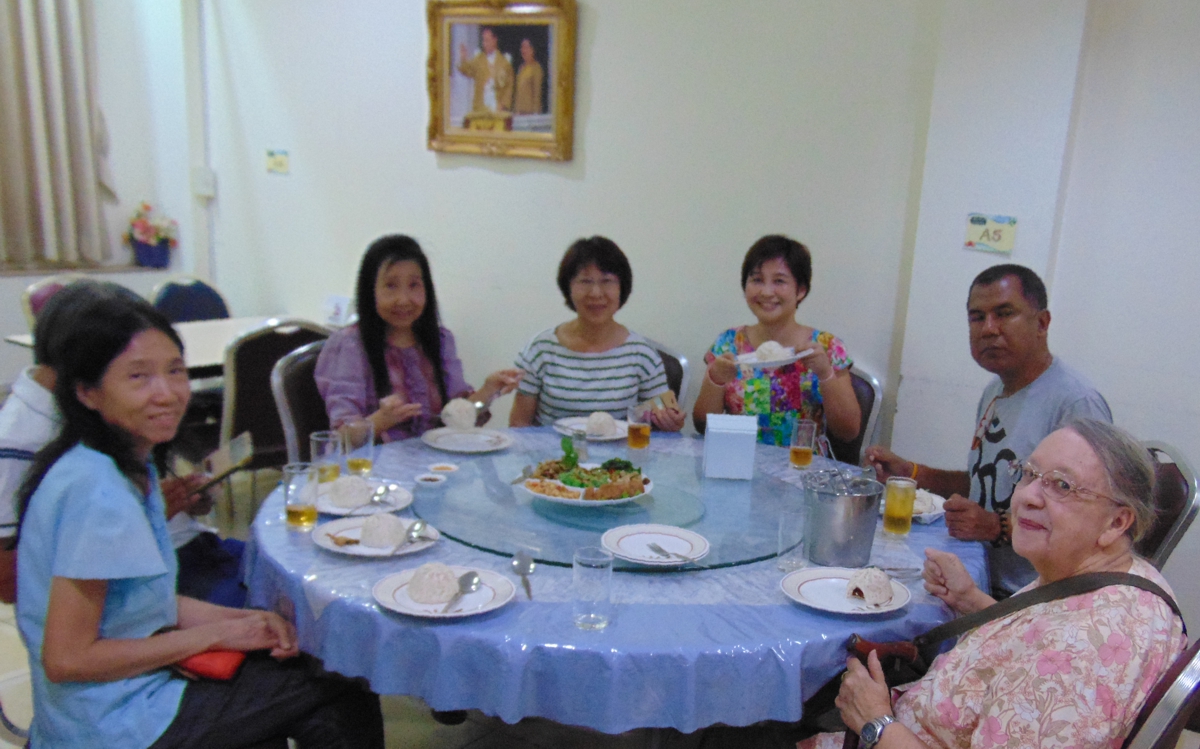 |
|
|
Two Weeks in Bangkok
Click the photo to see photos and read about the trip. |
|
If you don't know exactly what you want and where the shop is, shopping in Bangkok can be horrible. It used to be fun, but that was in the days of small shops and local markets. Every part of the city was different, but each neighborhood was charming and exciting to explore and discover. That has changed. The small shops and local markets are all gone. They have been replaced by gigantic malls, occupied mainly by exclusive and expensive boutiques. Some of the malls are in several sections, connected by various bridges, and it is easy to get lost therein. You almost feel like "Charlie on the MTA." Our goals were so specific, however, that we were sure that we would not have much trouble. Ha!
One morning, we caught a taxi to Ma Boon Khrong (MBK), where our friend had told us that we would find the Apple TV. This is one of the oldest malls in Bangkok, and we had been there several times before, successfully finding several items we wanted. We remembered that it had recently been renovated with spacious, well-lighted aisles and many local shops, as opposed to the Versace, Gucci, Samsung, an Adidas shops of the newer malls. We were neither surprised nor disappointed at first. Ken left Visakha in Amazon Café, where she was very comfortable drinking cappuccino and reading Journey to the West (4 Vols. brilliantly translated by Anthony C. Yu, U of Chicago), and searched for an escalator.
 |
|||
|
The Best Dressmaker in Bangkok
Please click |
|||
The fourth floor defies description. The entire floor is cellphone shops. The aisles are about two feet wide. There must be at least three hundred shops, each with a catchy name: "PhoneSmart," "MobileZ," etc. On display are more phones than there are human beings in Thailand, of whom half were wandering on that floor.
Ken asked at seven shops for Apple TV, but the clerks all shook their heads. One informed Ken that he would have to go to the Apple shop in Paragon, one of the most famous malls Not giving up, Ken wandered through the aisles, looking for something that looked like a TV. (Actually, he had no idea what an Apple TV was, but he thought it didn't matter.) Finally, as he was searching for the proper escalator, he passed a friendly-lookng young man who smiled and asked in impeccable English, "May I help you?"
"Apple TV," Ken replied and watched the light bulbs flash through the clerk's mind.
 "Come with me," he said and led Ken back across the floor to a shop five aisles away. "Apple TV," he said to a middle-aged woman behind a counter, who pointed to a black box inside her glass case. 'The young man again smiled at Ken and left. The woman, with great difficulty, reached deep inside the case and extracted the box, which was about six inches square and two inches tall. She opened the box and showed Ken the solid black "paperweight" and the slim remote. Under the cube were a white cable and two instruction leaflets only in Thai. Ken asked whether it was 3rd Generation, and she assured him that it was.
"Come with me," he said and led Ken back across the floor to a shop five aisles away. "Apple TV," he said to a middle-aged woman behind a counter, who pointed to a black box inside her glass case. 'The young man again smiled at Ken and left. The woman, with great difficulty, reached deep inside the case and extracted the box, which was about six inches square and two inches tall. She opened the box and showed Ken the solid black "paperweight" and the slim remote. Under the cube were a white cable and two instruction leaflets only in Thai. Ken asked whether it was 3rd Generation, and she assured him that it was.
"Tao arai?"
"8500 baht."
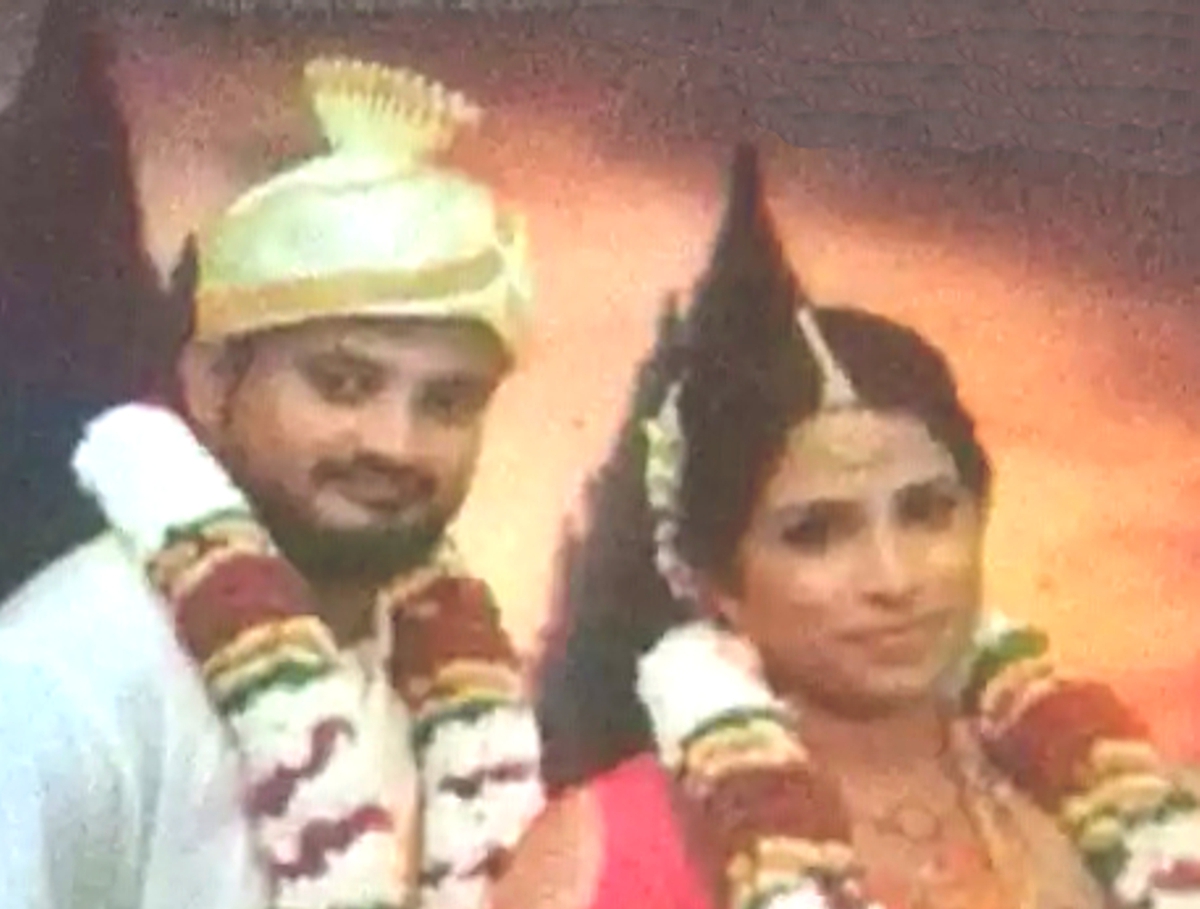 |
||
|
A Wedding Celebration
Click the photo to see more photos. |
||
"You wait. I call boss."
After speaking in Thai for a few minutes on the phone, she informed Ken that this one was second-hand, and that he could have it for 6000. Ken said that he wanted a new one.
"New one 8500," she insisted.
"Do you have a new one?"
"Wait. I call boss."
She disappeared and returned thirty seconds later with a younger woman.
This woman told Ken that she would go and buy a new one, but, for that, she had to have 8500 baht immediately. That did not seem like a good idea, so Ken returned to Amazon.
It was mid-afternoon by the time we got back to the hotel. We drank some coffee and snacked on nuts we had carried from Sri Lanka. We were not far from the Birkenstock shop, so, once more, Ken left Visakha (this time in the hotel room). He caught a tuk-tuk to the shop with not much difficulty. Unfortunately, there was no Arizona in stock smaller than 45. (Ken is 41, and Visakha is 38.) He had some other styles (not leather) in 38 and 41, but he would not accept the credit card. Fortunately, Ken did not have any cash with him.

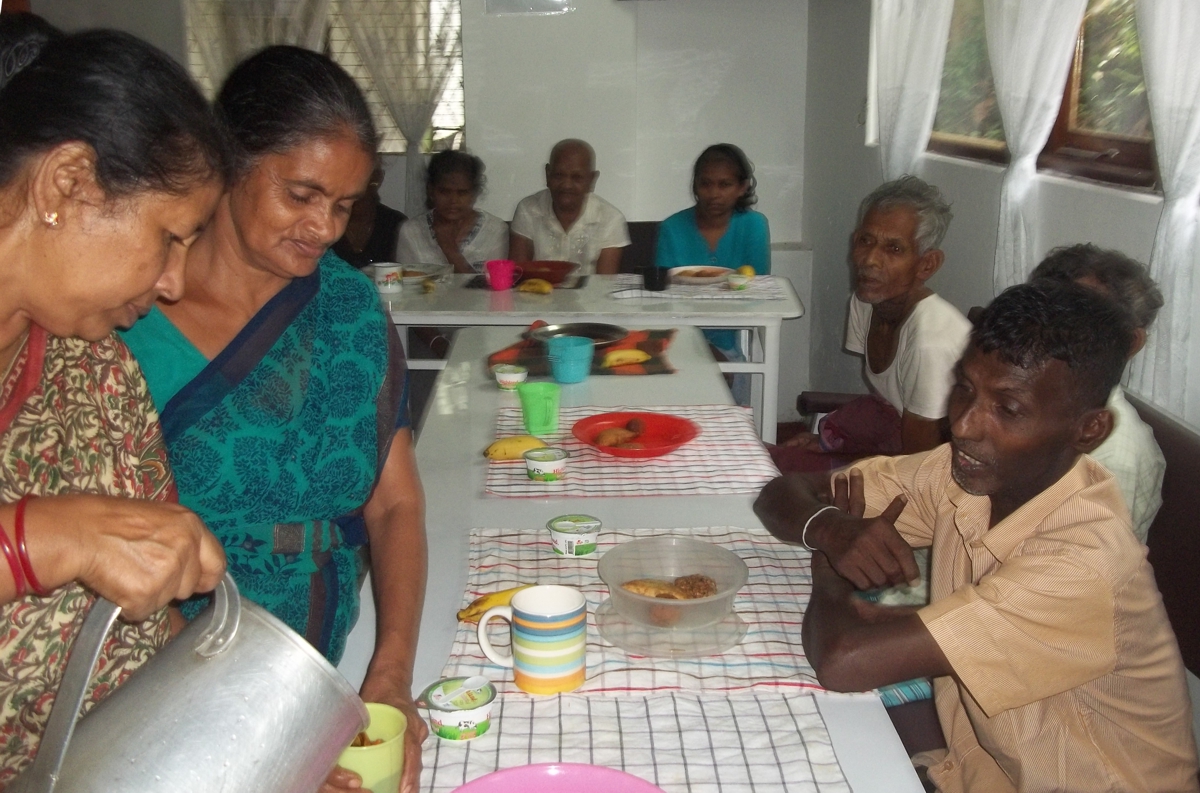 |
|
|
Tea at the Cancer Home
Click the photo to see more photos |
|
As Ken was going through the receipts, he noticed that the one for the shoes did not look right. He had asked for a discount, but this was ridiculous. He called the department store, and the clerk remembered the transaction but could not understand Ken's explanation of the mistake. Since the store was open until 10 PM, Ken agreed to hoof it there once more. He showed the receipts to the clerk. She called her manager, and they agreed that he had, indeed, been undercharged $100, which he promptly paid. They apologized for the mistake, and Ken returned to the hotel, a bit tired, but virtuous.
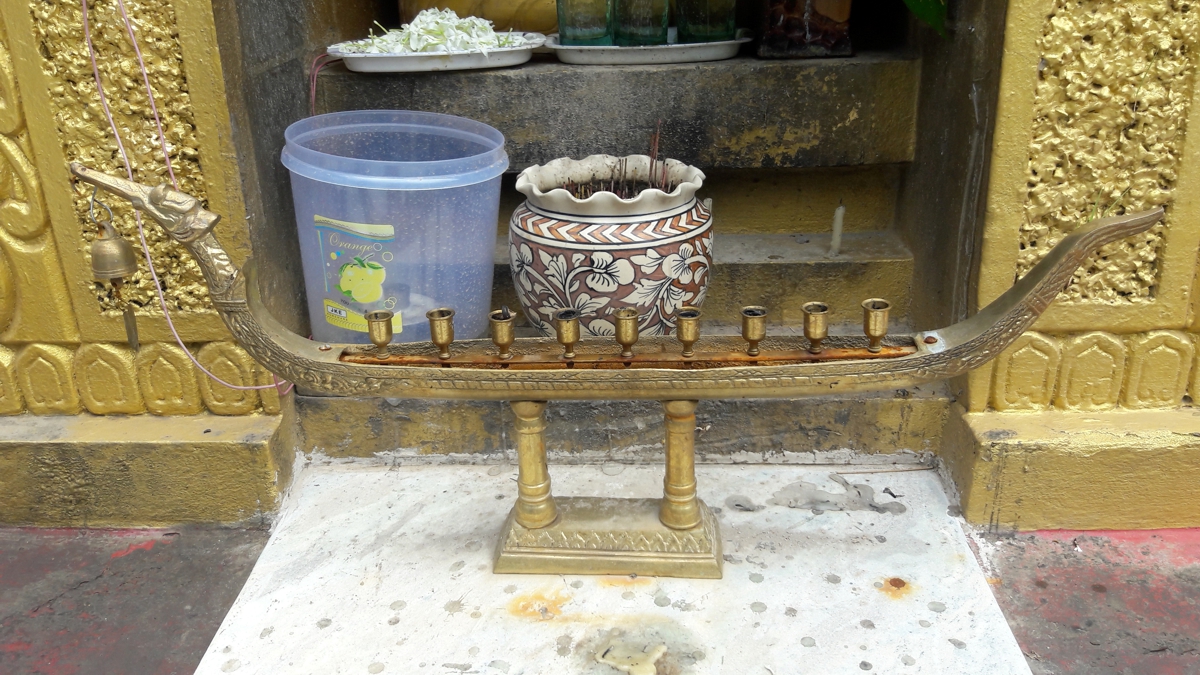 Now, the candelabras! Che had sent us a photo of the candelabra he wanted us to match. Actually, we had, about ten years ago, given a smaller one to Bodhisukha, and the monks had placed it on the pagoda. A few years later someone had stolen it. Then a monk presented the temple with a larger one. Finding that this one was not so easily pilfered, the monks wanted three more for the other niches of the pagoda. Che had also sent us the front and back of the card of the shop with which he had discussed the candelabras. He had also sent us the email messages, but he had not mentioned the name of the shop. Everything on the card was in Thai, but we noticed an image of the Giant Swing, so we knew that it was near Wat Suthat (the main area in Bangkok for Buddhist shops), but that is all we knew.
Now, the candelabras! Che had sent us a photo of the candelabra he wanted us to match. Actually, we had, about ten years ago, given a smaller one to Bodhisukha, and the monks had placed it on the pagoda. A few years later someone had stolen it. Then a monk presented the temple with a larger one. Finding that this one was not so easily pilfered, the monks wanted three more for the other niches of the pagoda. Che had also sent us the front and back of the card of the shop with which he had discussed the candelabras. He had also sent us the email messages, but he had not mentioned the name of the shop. Everything on the card was in Thai, but we noticed an image of the Giant Swing, so we knew that it was near Wat Suthat (the main area in Bangkok for Buddhist shops), but that is all we knew.
We created a page with the two sides of the card enlarged and emailed it to the front desk of the hotel. The clerk printed it for us, and told us that the name of the shop was BUACHART. We felt emboldened to head out the next morning after breakfast. We showed the taxi driver the print-out, and he said, "OK," and placed the paper on the passenger seat. At a stoplight near Wat Suthat, he fumbled for his glasses, put them on, and picked up the paper and examined it.
After a few minutes, we approached the Giant Swing where there are many Buddhist shops. We passed a few and drove on slowly. Then the driver stopped, asked us to wait, and stepped out of the car. He showed the paper to several people, who pointed in different directions. Seemingly more confident, he headed off down a different street, frequently asking vendors and pedestrians "Buachart?"
Finally, he stopped and asked a motorcyclist who nodded and pointed knowingly to a side street. We followed his directions, but did not find the shop.
Ken held up his telephone and asked in Thai: "Torasop dai mai?"
 |
|
|
English Day at Wimalabuddhi School
Click the photo to see more about this event. |
|
We paid the driver and gave him a big tip. He was very cheerful and had done a great job of finding the shop. High on one of the buildings, we saw a red sign and were able to discern that the Thai was the same as on the card. We asked the woman in that shop, "Buachart?" and she pointed back to the corner, where we saw a man on the sidewalk gesturing.
As we approached, he asked, "Taxi? Torasop?"
We nodded and entered his tiny shop."Email, India, Che Garcia," we said and showed him a copy of his email on Ken's phone. He indicated agreement, walked over to a glass case, and pulled out a candelabra. "Chai! Chai!" we announced.
Then, a young monk who happened to be in the store asked, in perfect English, exactly what we wanted. We explained, and the young monk (who was Vietnamese) translated.
The man pulled out the three pieces and expected us to pay for them and carry them away.
We told him that Che had asked him to mail them to India and that he had agreed. He thought for a moment, finally giving us the price and mentioning an exorbitant amount for postage.
After a bit of haggling, we finally gave up and told him that we would buy them and mail them ourselves.
The clerk packed the candelabras and our other purchases in a box, which we got back to the hotel with no problem.
 |
|
|
Prison Activities
Click the photo to see more photos and to read about these activities. |
|
We cut one end of the box, opened it flat, refolded it so that the sides were one inch longer and the ends were one inch shorter, and taped it together again.
The new box seemed perfect. We recycled all the bubblewrap from the books (Jataka Tales, A Pilgrims Companion, and Buddhist Crossword Puzzles) which we had left on consignment at MahaMakut Bookshop and repacked the three candelabra safely and tightly. It was a very neat box. We even tied it with the nylon string from M. Buachart.
The next morning, we took the box downstairs and hailed a taxi for Praisinee Klang (the Central Post Office), of which we have many fond memories of mailing refugee craft back to Japan for fundraising. The post office layout, however, has completely changed.
 |
|
|
Breakfast at Vajirarama
Click the photo to see more photos of this celebration of birthdays. |
|
We carried our box into a very modern office and checked it in with no problem. The clerk pointed out, however, that nylon string was not allowed. She pointed to another counter and told us to have them bind it and to bring it back to her. As we placed it on the counter for tying, we noticed that there was a sharp brass point peeking through a corner of the box.
We asked the clerk to stop the binding machine and pointed out that it would have to be repacked. The first clerk explained that there was a packing service in the next building.
She assured us that we could post it from there and that we needn't come back. She cancelled the postage and returned our money.
In the next building, Ken placed the box on the repacking counter and rushed back to help Visakha up the stairs. When he returned to the counter, he found that the clerk had begun binding it. He quickly told them to stop, showed them the tiny protrusions, and asked for "Repacking." The senior clerk patted the box, scratched his head, and pulled out another box of completely the wrong dimensions. Cutting that box open, he laid it flat, and placed our box on it. Then he carefully measured the sides and marked them on the flat piece. Very neatly, he folded the new box around the old, taped it securely, and created a perfect outer shell.
We addressed the new box and carried it to the postage counter. The new postage was only 200 baht more than it had been for our box. The packing cost only 100 baht. We had spent no more than one hour at the post office; everything had been managed very efficiently.
Before we left, we asked for the rest room and were directed through another set of doors. There we could see the sorting rooms, which looked very much like those of any PO. In the hallway, however, was a beautiful piece of furniture. It was the solid wood oval bench which had sat for many years in the packing section of the old post office, which we'd first visited in 1979! How many times we had sat on it reading letters from Poste Restante, sorting through our parcels, or waiting while the clerk packed one of our boxes!
A few days ago, we learned from Che that the box had arrived at Bodhisukha!
 |
 |
 |
|
In conclusion, we would like to present this message, which has just been posted. It offers a ray of hope for sanity in this upside-down world. Please click on the color image beside the text below to read excerpts and to hear a YouTube recording of the full statement.
May all beings be happy!
May none wish harm on another!
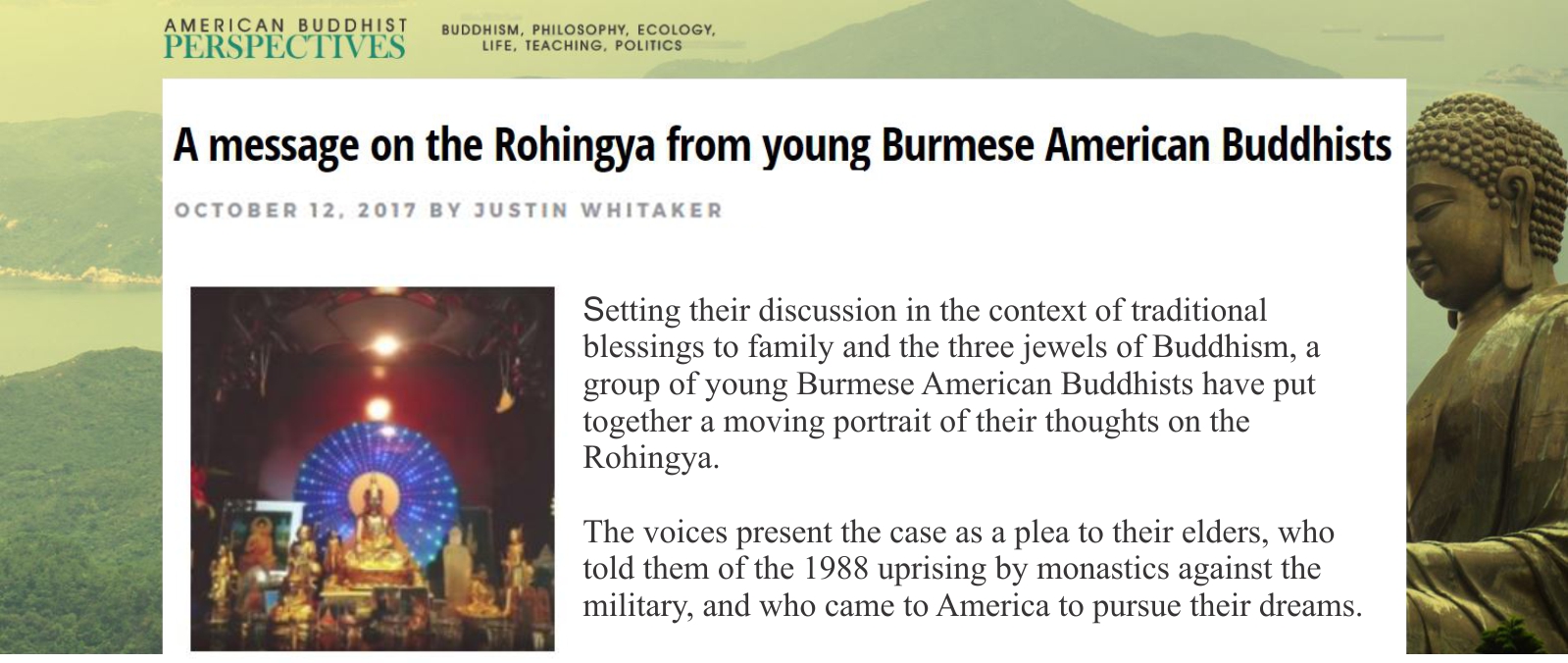
 |
 |
|||||||||||||
|
Class and Dana at the house, July 27
|
||||||||||||||
 |
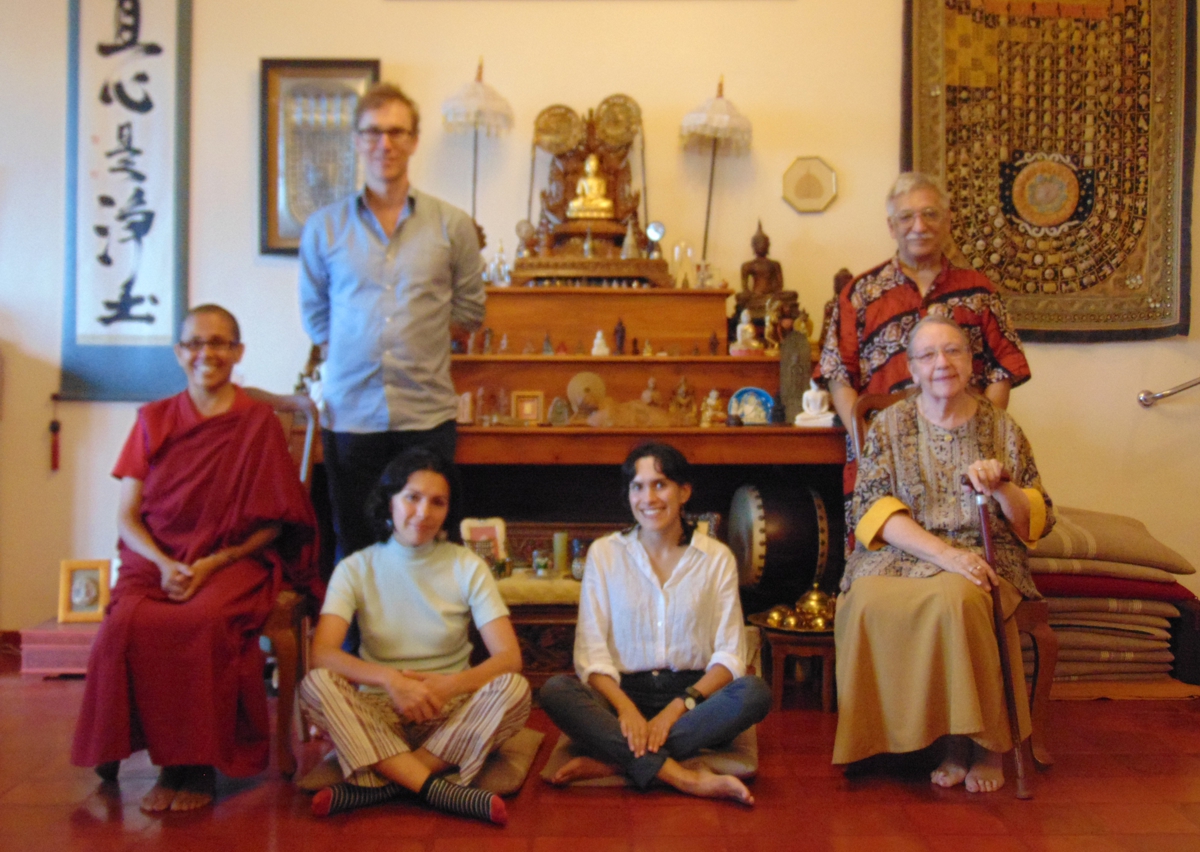 |
|||||||||||||
|
Courtney, a Fulbright scholar, and Lily
|
Ven. Lekdron with her two daughters from Australia
|
|||||||||||||
 |
 |
|||||||||||||
|
At Rangitha's house
|
Australian SERVAS guests, Piers and Kerri
|
|||||||||||||
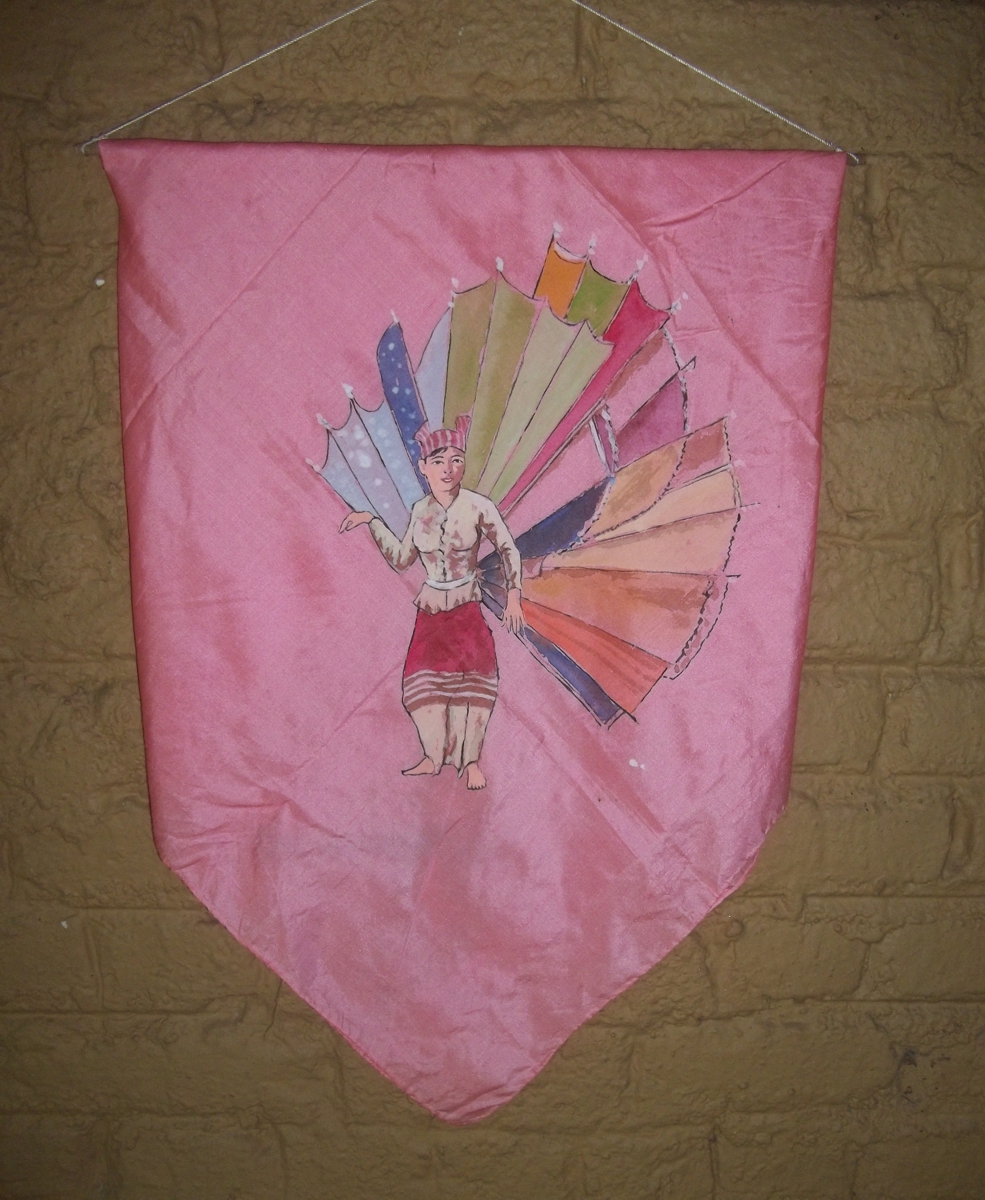 |
 |
|||||||||||||
|
Shan painting by a member of ABSDF
|
Shehan and Dilan, Edmond's grandson
|
|||||||||||||
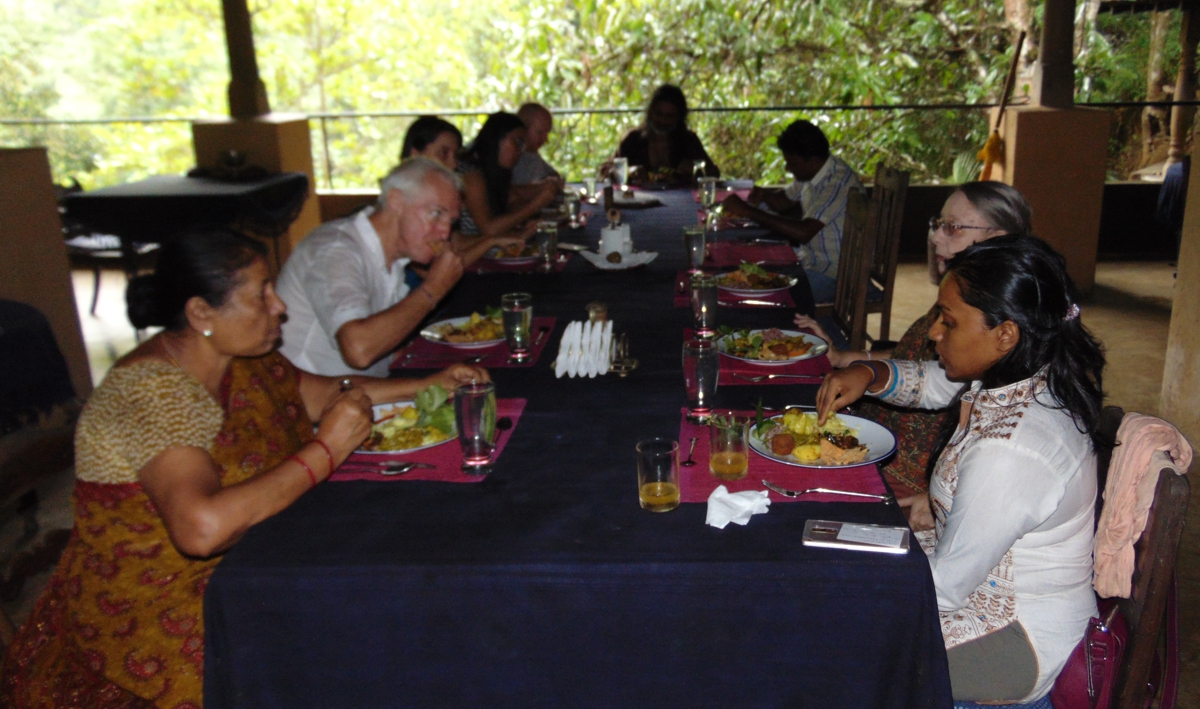 |
||||||||||||||
|
Waruna invited us for lunch at his Kandy Samadhi Centre
|
||||||||||||||